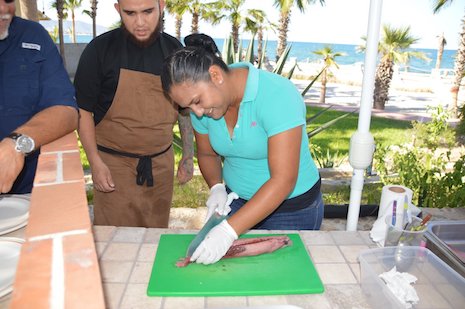 Tourism pumps money back into local economies, including through the purchase of souvenirs. Image credit: Ritz-Carlton
Tourism pumps money back into local economies, including through the purchase of souvenirs. Image credit: Ritz-Carlton
NEW YORK – Sustainability in travel extends beyond environmental efforts to the way in which hospitality firms engage with the local community.
From hiring and providing jobs to locals to sourcing products including food from nearby producers, travel firms have the potential to have a significant impact on the areas in which they operate. In a panel discussion at Bloomberg’s The Year Ahead: Luxury conference on Nov. 21, speakers shared how they are making travel more responsible, as consumers increasingly use sustainability as a guiding factor for their tourism.
"We cannot be successful if we are not embedded within that community," said Denise Naguib, senior vice president sustainability and supplier diversity at Marriott International. "We cannot stand alone as a building that people come in and out of without having that connection."
Local impact
Moderator Nikki Ekstein, travel editor at Bloomberg Pursuits, shared the statistic that travel has accounted for one in five jobs created in the last five years.
While tourism is a job creator, Saira Hospitality founder/CEO Harsha Chanrai L'Acqua saw the need for a change in how the hospitality business hires. As companies come into new regions, they often poach talent from other hotels, leading to a turnover rate approaching 75 percent.
There is often a disconnect between hiring managers and locals who need jobs, but who may not already have the exact skillsets needed for a role. Looking to solve this problem, Ms. Chanrai L'Acqua's nonprofit trains members of the local community through pop-up schools.
Saira Hospitality food and beverage training. Image credit: Saira Hospitality
The schools are funded by hotel operators, and they are mutually beneficial for both the hotel companies and locals. Turnover rates for Saira Hospitality graduates stand at about 10 percent.
Ms. Naguib noted that Marriott also hires and develops local talent, which helps to create a sense of place.
For Marriott, sustainability is a group-wide endeavor, rather than being focused on specific brands or locations.
In 2017, the group created a set of goals around sustainability. One of the core benchmarks is reducing waste by 45 percent between 2016 and 2025.
A key focus is on food waste, which contributes to 11 percent of carbon emissions globally.
Marriott has tested and made changes to cut back on over production. For instance, instead of having cooks continuously replenish large platters throughout the breakfast buffet, they instead progressively switch to smaller containers to give the appearance of fullness without the waste.
Beyond individual companies’ efforts, sustainability is having an impact on how consumers choose to travel.
Albert Herrera, senior vice president of global product partnerships at Virtuoso, pointed to the firm’s research, which has shown a consistent uptick in consumers who say that sustainability impacts their plans. In the 2019 edition of the survey, the population considering sustainability reached 75 percent.
"[Consumers] want to have travel with purpose," Mr. Herrera said. "We want to make sure that it’s relevant, that it helps educate the people, their kids, and that’s what’s important. It is changing, especially with those that have the time and the luxury spend."
Amid issues of overtourism, Mr. Herrera sees the answer as education and alternatives rather than avoidance. For instance, those wishing to visit Venice can travel in the months before or after the peak season, preventing overcrowding while also giving business to locals in what would otherwise be a slow time.
Venice is a city that is struggling with overtourism. Image credit: DFS
The state of locations also has an impact on how attractive they are as destinations. Plastic pollution in an ocean environment may make travelers less apt to want to visit.
Ms. Naguib said Marriott focuses not only on the destinations themselves, but on the root cause of an issue, such as where plastic pollution originates.
Sustainability in action
As travelers become more environmentally conscious, luxury hotel brands are introducing more sustainability initiatives that prove hospitality does not need to sacrifice upscale experiences to achieve ecological and social responsibility.
Hospitality groups such as the Peninsula Hotel and Marriott International have been increasingly transparent with their guests about their newest sustainability efforts, which aim to benefit people and the planet. Environmental efforts do ultimately impact brands' bottom lines, whether through additional expenses or appealing to more travelers (see story).
Marriott International is seeking to reduce its plastic waste by eliminating single-use toiletry bottles in its guest bathrooms.
After ridding its hotels of plastic straws, Marriott is tackling another source of plastic waste by replacing individually sized bottles of shampoo, conditioner and bath gel with larger pump containers. The program is already in place at about 1,000 properties, and Marriott expects most of its hotels to make the switch by December 2020 (see story).
Marriott's toiletry move is indicative of its group-wide approach to sustainability, which does not segment efforts by brand or type of property.
"Our goal is to lift all boats, in order to really be a responsible company," Ms. Naguib said. "And as the largest hotel company, we do have that responsibility to lead and really drive sustainability, social impact throughout our industry.
"We have to understand what that looks like universally," she said. "It’s not going to be the same thing everywhere we go, but it’s absolutely imperative that we understand that it’s not just for the places that can do the right things, that they’re allowed to do it and everyone else sits behind."

